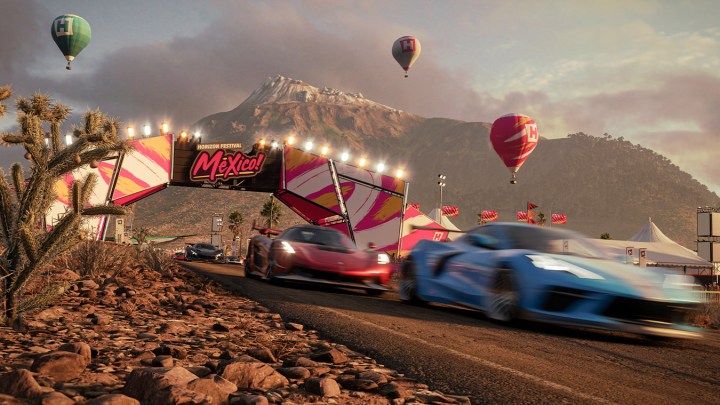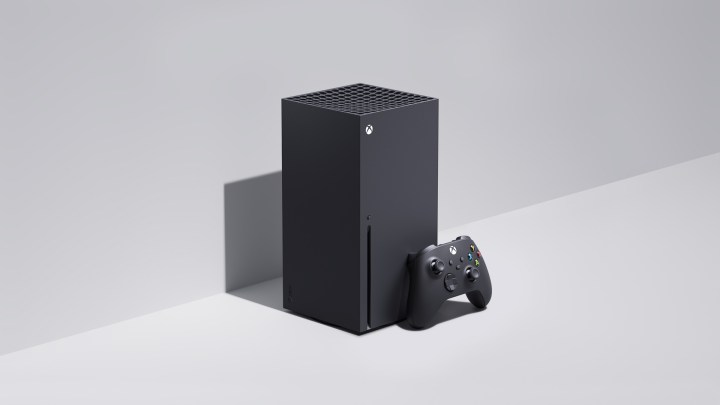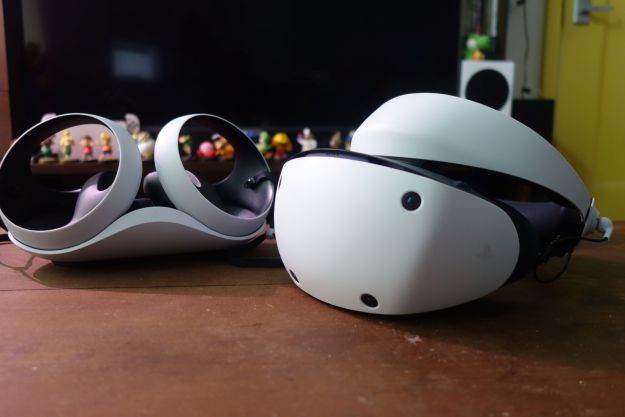It’s hard to believe that we’re already one year into the life spans of the PlayStation 5 and Xbox Series X/S — mostly because many players still haven’t been able to buy them.
It’s no stretch to say that this has been one of the most frustrating and unstable console generation launches in the video game industry’s history. Launching a system during a pandemic would already be hard enough on its own. But toss in a chip shortage, and you have a set of consoles that are incredibly difficult to track down and don’t yet have a year’s worth of games to reward that effort due to a slew of delays. Even so, both Sony and Microsoft have created powerful gaming machines that are still worthy of being excited about heading into a stacked 2022.
Both the PS5 and Xbox Series X/S have their own strengths, with each filling a different role for gamers. But in the spirit of friendly competition, we can’t help but ask: Which console came out on top in their opening year?
Hardware
When discussing pure power, the difference between the PS5 and Xbox Series X is almost negligible. Both systems are about on par with one another, with minor differences. Both systems are capable of outputting 8K visuals and running games at 120 frames per second (fps). At the moment, there’s no huge difference when it comes to playing a game on Series X or PS5, even if Microsoft’s console is running a slightly better CPU and GPU.

The Xbox Series X does have an edge, though it doesn’t have to do with visuals. Its internal hard drive is a bit bigger than the PS5’s. That was more noticeable at launch, when the PS5’s external storage solutions were more limited. Sony has since remedied the problem by adding support for more drives, but the smaller onboard storage does stand out. I’ve found myself deleting games far more often on my PS5 than I have on my Series X. The extra gigabytes really do make a difference when game files are so big.
The Series X gets the edge in this department, but it’s more a technicality than anything. The system is more powerful on paper, but we haven’t seen that manifest in any meaningful way that makes the PS5 look weaker. Storage is really the one aspect that’s made a difference for me in the past year of gaming.
Advantage: Xbox Series X
Features
When it comes to console features, Sony has a clear advantage. Microsoft took a conservative approach to this console generation and built a straight home console with no real gimmicks. Its biggest marketing push was the promise of Smart Delivery, which allows Xbox One owners to carry games over to Series X when they upgrade. However, that’s started to feel like little more than a clever marketing spin over the past years, akin to Sega’s “Blast Processing.” The PS5 also supports cross-generational purchases for several of its games. It doesn’t have a fancy name, but it’s essentially the same thing.
The PS5 has brought several innovations to the table, though with mixed results. The DualSense controller promised more immersive gaming thanks to haptic feedback and adaptive triggers. In some cases, that’s really worked. Both Returnal and Astro’s Playroom are transformative experiences that really benefit from extra sensations. Other games, like Marvel’s Spider-Man: Miles Morales, hardly use the controller’s gimmick at all. And other titles can be downright painful to play at times. Pulling highly resistant triggers to shoot in Ratchet & Clank: Rift Apart is genuinely unpleasant.

Other promising features have been a mixed bag. The system’s card feels like a revelation when playing games like Deathloop, but developers have been slow to fully adopt it. I’m not finding many games that use cards to give useful time estimates or ways to fast travel to objectives. Sony’s first-party games tend to use it well, but it still hasn’t lived up to its potential. Other initially exciting features, like the ability to look up a guide video on the fly, have barely made a difference. For the most part, I haven’t engaged with many of the PS5’s nuanced features.
Even if the PS5 hasn’t lived up to its ambitions, I still appreciate having more features to play around with. At worst, developers ignore them altogether and it feels like I’m playing a game on any old system. But I’m still having unique experiences on PS5 every so often that change the way I engage with games. The Series X plays it straight by comparison and still feels a little less special for it one year later.
Advantage: PS5
Games
In the past, consoles would be defined by their library of first-party exclusives. The Series X has completely flipped that script and showed that exclusives aren’t as important as they used to be. I’ll get to that shortly, but it’s still worthwhile to look at each system’s “year one” library, as they speak to each company’s strategy.
When it comes to exclusives, it’s a bit one-sided here. Sony had a clear advantage right from launch by releasing Marvel’s Spider-Man: Miles Morales, Demon’s Souls, Sackboy: A Big Adventure, and Astro’s Playroom. Over the next 12 months, it would release a string of critically acclaimed hits in Returnal, Ratchet & Clank: Rift Apart, and Deathloop. By comparison, Microsoft has very few exclusives to its name. Forza Horizon 5 is frankly one of the few “system sellers” to release for the Series X, and it just came out mere days ago. Exclusive games simply aren’t part of Microsoft’s long-term strategy — for now, at least.

Granted, Sony made some big launch year promises it couldn’t deliver on. Heavy hitters like Horizon Forbidden West and God of War Ragnarok were delayed to 2022, which felt inevitable. There’s still only a handful of “must-have” exclusives on the system, which has made the mad dash to secure one a bit silly. In truth, neither console is really worth buying based on game library alone. Someone who’s still on a PS4 or Xbox One frankly hasn’t missed much other than two or three solid games.
Even so, the PS5 game library has an obvious advantage here. Its few exclusives are all top-notch and show why Sony’s commitment to high-quality exclusives still pays off. The fact that Returnal, a totally new IP from a smaller studio, is one of the PS5’s best games shows that Sony is taking all of its exclusives seriously. Every time it releases one, you know it means business.
Advantage: PS5
Long-term value
In the past, this conversation would have stopped there. Sony has the games, so what more is there to discuss? But Microsoft has ingeniously flipped the script, changing the way we think about a video game console’s function. That’s where Xbox Game Pass comes in.
Game Pass has only become a stronger value in the Xbox Series X generation. For one, all first-party Microsoft games come to it on day one. Encouraged by the strong reviews of Forza Horizon 5, but don’t want to spend $60 on it? You don’t have to if you have Game Pass. The same will be true for Halo Infinite next month, and it’s impossible to overstate how huge that is for Microsoft fans.

It’s not just the exclusives that benefit from Game Pass, though. Microsoft has shown that Game Pass pays off in the long run for those who buy third-party games. Outriders, MLB The Show 21, Scarlet Nexus, and It Takes Two are among some of the top 2021 releases that Game Pass subscribers simply didn’t need to buy. That’s $200 worth of games included with a subscription, and it’s only the tip of the iceberg. Buying a Series X and subscribing to Game Pass pays off in the long run, making the console a smarter investment.
The PS5 still has long-term potential thanks to its consistent library of exclusives, but the ecosystem isn’t as strong. Subscribing to PS Plus gives access to a few free games a month and the PS Plus Collection, but you’ll still pay for the biggest games individually. That’s not a problem; it’s how consoles have always worked. But Microsoft’s strength is that it’s reimagined that process and turned Xbox into a full service that’s worth buying into.
Advantage: Xbox Series X
Which console is king in 2021?
It sounds backwards considering Microsoft’s lack of console-selling exclusives, but the Xbox Series X is the most appealing console at the moment.
Microsoft’s goal over the past 12 months was to prove that the Xbox ecosystem is worth buying into, even after Halo Infinite was delayed outside of its launch year. It wasn’t an easy task, but every move the company has made with Game Pass has been effective. I can’t begin to describe how few games I’ve needed to buy this year. Interested in playing an indie like Unpacking or Moonglow Bay? It’s in my library already. Curious about Outriders, but not $60 curious? I didn’t need to spend an extra dime to play it. I bought Scarlet Nexus at launch for full price and ended up putting it down after six hours. I was kicking myself months later when it was added to Game Pass.

Granted, if you don’t want to buy into Game Pass, the Series X becomes much less appealing. Its power advantage over the PS5 is negligible and it lacks some of the bells and whistles that make Sony’s console so fun. A Series X is a long-term financial commitment that not every player will be comfortable making. In that sense, the PS5 has made a stronger case for being a system you don’t need to keep pumping money into.
I’m pitting these two systems against one another here for fun, but make no mistake: Sony and Microsoft aren’t really in competition with one another. Or at least, not in the same way that we’re used to. Both companies are taking a page out of Nintendo’s book by charting their own niche in the gaming space. Sony wants to double down on huge, cinematic action games that feel like Hollywood movies. Microsoft wants to hook players into its subscription service and make it as essential as a Netflix account. Those are entirely different goals.
The truth is that both Sony and Microsoft have proved what they wanted to prove in the last year. There’s no winner or loser; it’s just a matter of which approach better suits your gaming habits. But, hey, for the sake of seeing this matchup through, I have to declare a victor, right?
Winner: Xbox Series X
Editors' Recommendations
- If you’re not using PlayStation Stars, you’re missing out
- Every rumored video game console: Nintendo Switch 2, PS5 Pro and more
- Fallout 4 is finally getting free Xbox Series X and PS5 upgrades
- Visions of Mana paints a promising picture of the RPG series’ return
- Dragon’s Dogma 2’s first updates will tackle its PC performance issues



